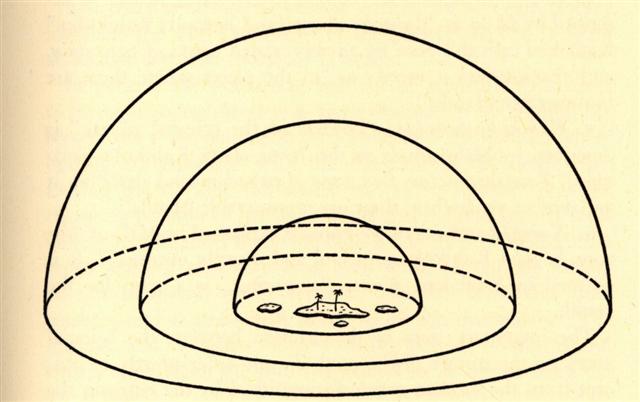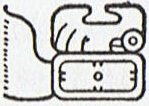5. Once again: The canoe reached the islets (off the coast), and Ira saw that there were three such islets. Ira said, 'Hey you, crew of young men, the vision of Hau Maka, our father, which he revealed to me, has come true. There are 'the handsome sons of Te Taanga, who are standing in the water', for this is the name that the dream soul of Hau Maka gave them. Unforgotten (? kai viri kai viri) are they, these three. And therefore this is the (right) land lying there; this is Te Pito O Te Kainga, which also received its name from the dream soul.' (Manuscript E p. 17.) Maybe 'unforgotten' is a hint that the old system of thought was not forgotten, although Christianity had tried to sweep it away: ... In other words, the ancient Druidic religion based on the oak-cult will be swept away by Christianity and the door - the god Llyr - will languish forgotten in the Castle of Arianrhod, the Corona Borealis ... Maybe the old system remains hidden in the skydome of the night. Te Taanga sound similar to te tatanga on the Gilbertese map of the sky. The horizon defines the limit of the sky dome and it cannot possibly be part of the central 'land', therefore nga kope ririva tutuu vai should not belong to Hau Maka:
And - we remember - the mother of Maui (born at the time when the 2 giantesses were taking a short break to recite a certain verse) was Taranga (sounding similar to Taanga and tatanga): Maui was the fifth and youngest of his parents' sons, yet when he was born his brothers knew nothing of it. They first learned that they had a brother when he was discovered one night standing behind them in the great meeting house. Everyone was present, the four brothers, their mother Taranga, and all the relations, and there was dancing going on, when little Maui crept into the house unseen, and went and sat behind his brothers. When it came to their turn to dance, and their mother stood them up and counted them so as to be ready, he stood up with them. 'One, that's Maui mua; two, that's Maui roto; three, that's Maui taha; four, that's Maui pae', she said; these names mean Maui the first, Maui the middle, Maui the side, and Maui the edge. Then she saw this other child standing with them, and cried out, 'Hullo, where did this one come from?' 'I'm your child too', Maui replied. So she counted them again and said, 'Oh no, there ought to be only four of you. This is the first I've seen of you.' Ta-tanga is not identical with Ta-ranga nor with Ta-anga, but the words are similar in sound and thus probably also in general meaning. Ta at the beginning is to be contrasted with Te - defining a region where Sun is present:
Akahanga in position 9 is where the Sun King is buried, and rereading the text we find tanga (as in ta-tanga) explained as 'all the youths' or 'all those assembled': ... After the three children of Hotu A Matua had been born, they went with his wife, Vakai, to Te Ngao O Te Honu and lived there. The last child of Hotu A Matua, Tuu Hotu Iti, was born. Vakai laid down and died. The king wept for his wife. Then the lamentation ceased, and all the youths (RAP. tanga; or, 'all those assembled', MAO. tanga) had the task of preparing the litter to carry the corpse. They lifted the corpse unto the litter. The men walked up and picked up the litter with the corpse. They carried it and went to Akahanga, to Ahu Ature Ho(a). They arrived and buried her. When that was over, Hotu A Matua sat down again to rest ... Possibly the horizon (te tatanga) is where at the end everybody will be 'assembled', caught by the grasping hand:
Te tatanga on the Gilbertese sky map is referring to the horizon in the west and nothing is said about the name of the horizon in the east. If the 3 islets (Nga Kope Ririva) correspond to the horizon in the west, then it will also be the horizon from which time advances (following the path of Moon). And Alpha follows after Omega in cyclic time, therefore the arrival of manu tara at the islets is the Sign of the arrival of a new year. Maybe Taranga is tara-nga, the point at which winter turns into summer. My explanation of te tatanga should be in harmony with the meaning of ta-raga, cosmic order demands it:
The tear drops of Alice run together into a little lake (raga), and there she has to swim (raga) together with a rat. In a whirlpool all things on the surface of the water accumulate (assemble) in its center, and the whirlpool illustrates the cycles of time. |

